For years we had hoped to purchase the internet domain sites ChurchofJesusChrist.org and ChurchofJesusChrist.com. Neither was for sale. About the time of President Nelson’s announcement, both were suddenly available. It was a miracle.
Neil L. Andersen
October 2021 General Conference
https://www.churchofjesuschrist.org/study/general-conference/2021/10/58andersen?lang=eng
Tag: Finances
-
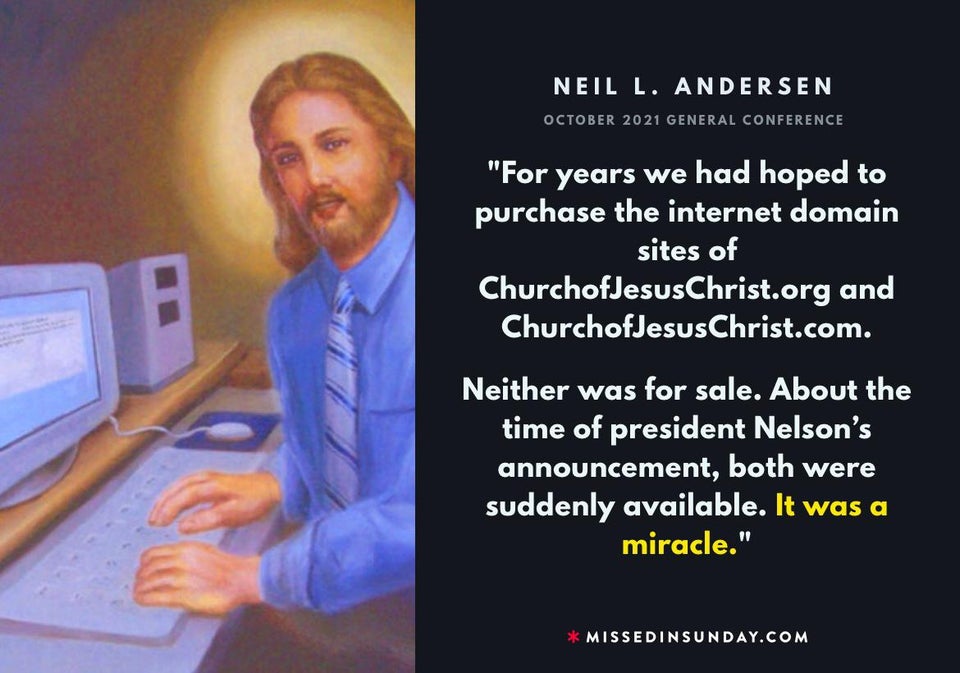
Internet Domain Miracle
-

Voluntary Offerings
Excerpt from ‘Tithing and Charitable Donations’, Church Newsroom: 1
All funds given to the Church by its members are considered sacred. They are voluntary offerings that represent the faith and dedication of members and are used with careful oversight and discretion. They are audited regularly by independent, certified auditors.
Excerpt from the June 1980 Ensign, First Presidency Message, Marion G. Romney: 2
My sincere counsel to all who receive this message is: pay your tithing and be blessed.
Tithing is not a free-will offering; it is a debt, payment of which brings great blessings.
References
References 1 ‘Tithing and Charitable Donations’, Church Newsroom – https://newsroom.churchofjesuschrist.org/article/tithing 2 June 1980 Ensign, First Presidency Message, Marion G. Romney – https://www.churchofjesuschrist.org/study/ensign/1980/06/concerning-tithing?lang=eng -
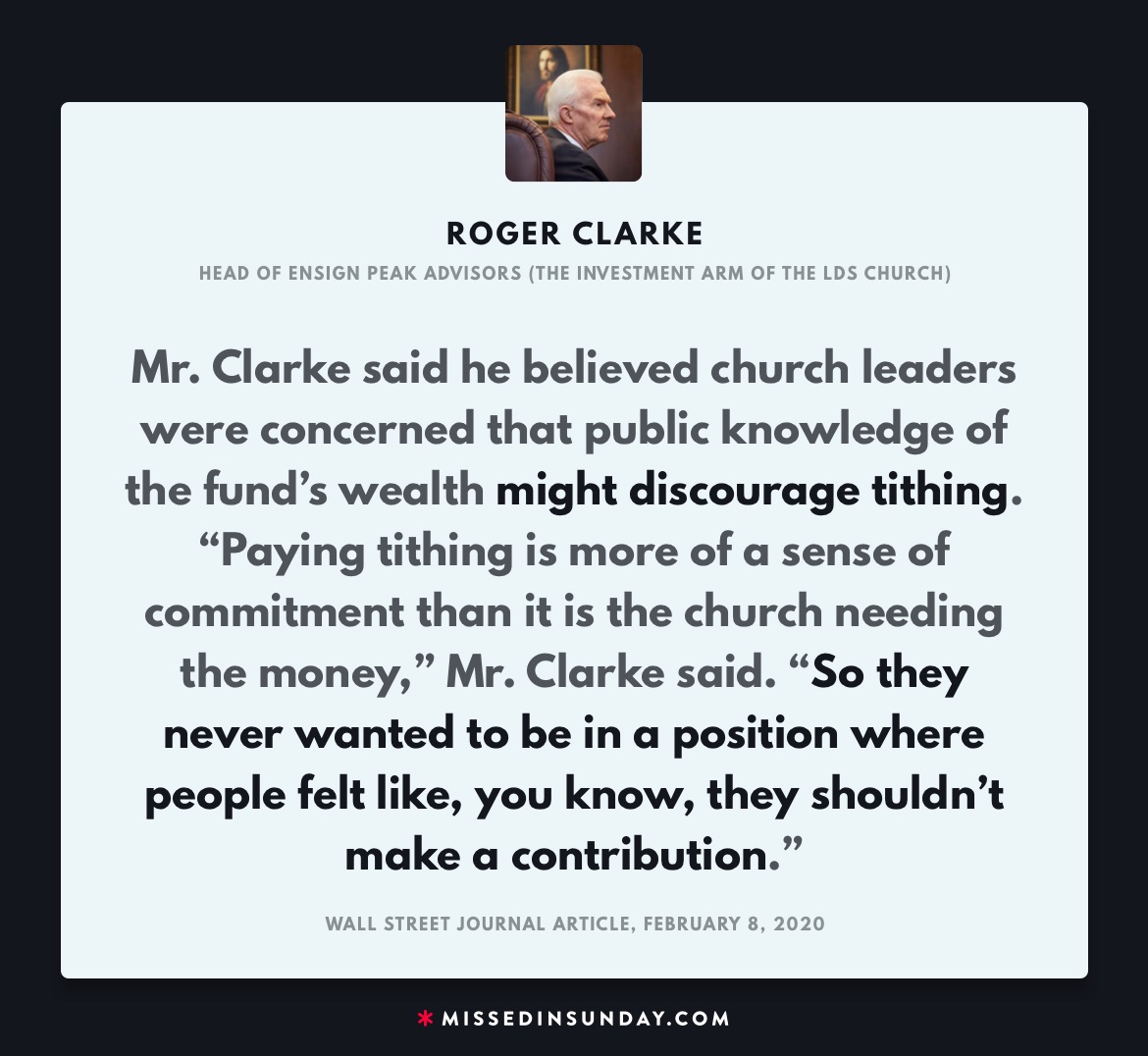
Contribution
Excerpt from the February 8, 2020 Wall Street Journal article, ’The Mormon Church Amassed $100 Billion. It Was the Best-Kept Secret in the Investment World.’: 1
For more than half a century, the Mormon Church quietly built one of the world’s largest investment funds. Almost no one outside the church knew about it.
Some of that mystery evaporated late last year when a former employee revealed in a whistleblower complaint with the Internal Revenue Service that the fund, called Ensign Peak Advisors, had stockpiled $100 billion. The whistleblower also alleged that the church had improperly used some Ensign Peak funds. Officials of the Church of Jesus Christ of Latter-day Saints, colloquially known as the Mormon Church, denied those claims.
They also declined to comment on how much money their investment fund controls. “We’ve tried to be somewhat anonymous,” Roger Clarke, the head of Ensign Peak, said from the firm’s fourth-floor office, above a Salt Lake City food court. Ensign Peak doesn’t appear in that building’s directory.
Interviews with more than a dozen former employees and business partners provide a deeper look inside an organization that ballooned from a shoestring operation in the 1990s into a behemoth rivaling Wall Street’s largest firms.
Its assets did total roughly $80 billion to $100 billion as of last year, some of the former employees said. That is at least double the size of Harvard University’s endowment and as large as the size of SoftBank’s Vision Fund, the world’s largest tech-investment fund. Its holdings include $40 billion of U.S. stock, timberland in the Florida panhandle and investments in prominent hedge funds such as Bridgewater Associates LP, according to some current and former fund employees.
Church officials acknowledged the size of the fund is a tightly held secret, which they said was because Ensign Peak depends on donations—known as tithing—from the church’s 16 million world-wide members. The church is under no legal obligation to publicly report its finances.
But the whistleblower report—filed by David Nielsen, a former Ensign Peak portfolio manager—has heaped pressure on the church to be more transparent about its finances, something the church has avoided for decades.
The firm doesn’t tell business partners how much money it manages, an unusual practice on Wall Street. Ensign Peak employees sign lifetime confidentiality agreements. Most current employees are no longer told the firm’s total assets under management, according to some of the former employees; few employees understand what the money is intended for.
In their first-ever interview about Ensign Peak’s operations, Mr. Clarke and church officials who oversee the firm said it was a rainy-day account to be used in difficult economic times. As the church continues to grow in poorer areas of the world like Africa, where members cannot donate as much, it will need Ensign Peak’s holdings to help fund basic operations, they said.
“We don’t know when the next 2008 is going to take place,” said Christopher Waddell, a member of the ecclesiastical arm that oversees Ensign Peak known as the presiding bishopric. Referring to the economic crash 12 years ago, he added, “If something like that were to happen again, we won’t have to stop missionary work.”
During the last financial crisis, they didn’t touch the reserves Ensign Peak had amassed, church officials said. Instead, the church cut the budget.
A former employee and the whistleblower in his report said they heard Mr. Clarke refer to the second coming of Jesus Christ as part of the reason for Ensign Peak’s existence. Mormons believe before Jesus returns, there will be a period of war and hardship.
Mr. Clarke said the employees must have misunderstood his meaning. “We believe at some point the savior will return. Nobody knows when,” he said.
When the second coming happens, “we don’t have any idea whether financial assets will have any value at all,” he added. “The issue is what happens before that, not at the second coming.”
Whereas university endowments generally subsidize operating costs with investment income, Ensign Peak does the opposite. Annual donations from the church’s members more than covers the church’s budget. The surplus goes to Ensign Peak. Members of the religion must give 10% of their income each year to remain in good standing.
Dean Davies, another member of the ecclesiastical arm that oversees Ensign Peak, said the church doesn’t publicly share its assets because “these funds are sacred” and “we don’t flaunt them for public review and critique.”
Mr. Clarke said he believed church leaders were concerned that public knowledge of the fund’s wealth might discourage tithing.
“Paying tithing is more of a sense of commitment than it is the church needing the money,” Mr. Clarke said. “So they never wanted to be in a position where people felt like, you know, they shouldn’t make a contribution.”
References
References 1 The Mormon Church Amassed $100 Billion. It Was the Best-Kept Secret in the Investment World – https://www.wsj.com/articles/the-mormon-church-amassed-100-billion-it-was-the-best-kept-secret-in-the-investment-world-11581138011?mod=hp_lead_pos3 -
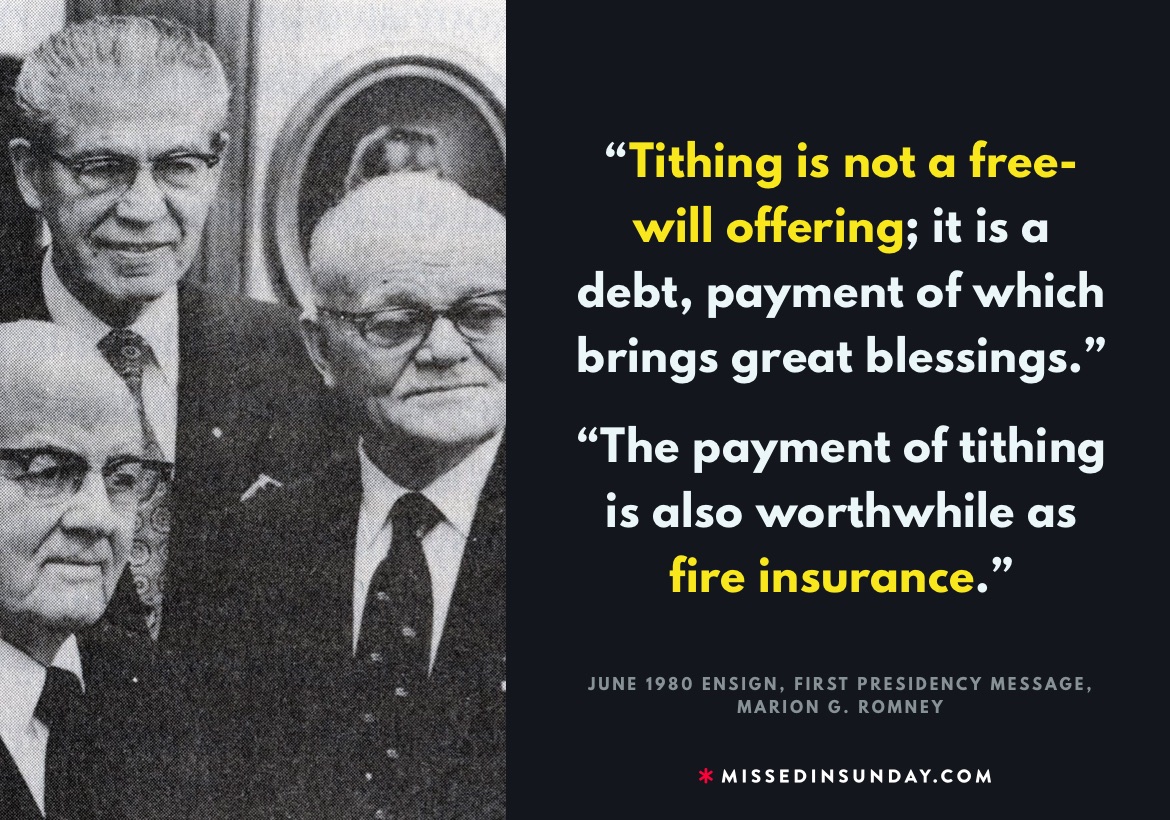
Not a free will offering
Excerpt from the June 1980 Ensign, First Presidency Message, Marion G. Romney: 1
Tithing is not a free-will offering; it is a debt, payment of which brings great blessings.
…
I consider the payment of tithing a sound financial investment. To those who pay their tithing, the Lord has said that he will “open you the windows of heaven, and pour you out a blessing, that there shall not be room enough to receive it.
…
The payment of tithing is also worthwhile as fire insurance. Through his prophets the Lord has told us that incident to his second coming, there will be a great conflagration. Malachi thus refers to it in connection with his pronouncement about tithes and offerings.
…
I know from my own experience, and I bear you my witness, that there is a peace and a comfort and an assurance which comes to one who pays an honest tithing. If you ever come to a time when you don’t know how much you owe, pay a little more. It is better to over-pay than to under-pay.
References
References 1 June 1980 Ensign, First Presidency Message, Marion G. Romney – https://www.churchofjesuschrist.org/study/ensign/1980/06/concerning-tithing?lang=eng -
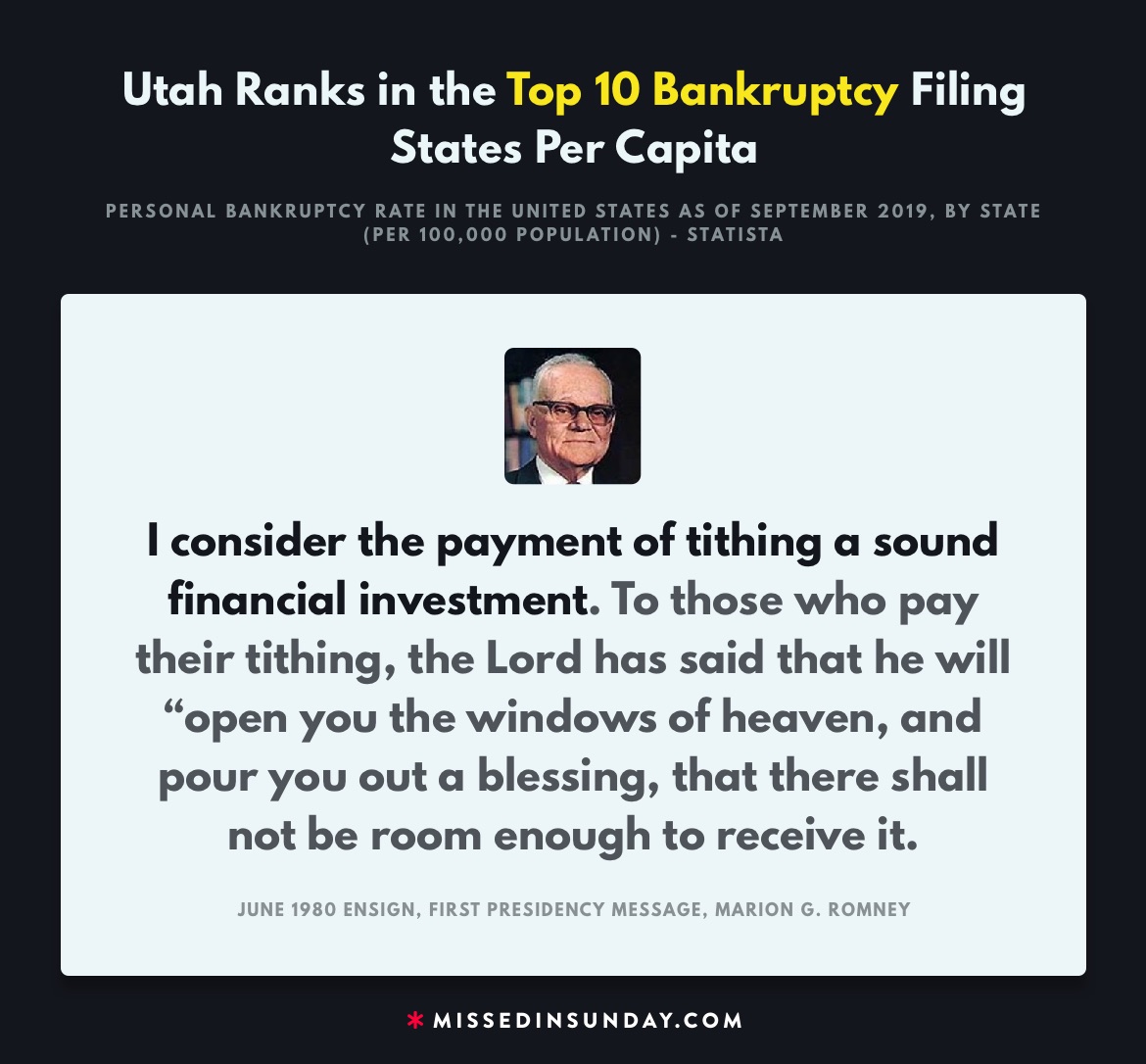
Bankruptcy
Utah Ranks in the Top 10 Bankruptcy Filing States Per Capita 1
Excerpt from the June 1980 Ensign, First Presidency Message, Marion G. Romney: 2
Tithing is not a free-will offering; it is a debt, payment of which brings great blessings.
…
I consider the payment of tithing a sound financial investment. To those who pay their tithing, the Lord has said that he will “open you the windows of heaven, and pour you out a blessing, that there shall not be room enough to receive it.
…
The payment of tithing is also worthwhile as fire insurance. Through his prophets the Lord has told us that incident to his second coming, there will be a great conflagration. Malachi thus refers to it in connection with his pronouncement about tithes and offerings.
…
I know from my own experience, and I bear you my witness, that there is a peace and a comfort and an assurance which comes to one who pays an honest tithing. If you ever come to a time when you don’t know how much you owe, pay a little more. It is better to over-pay than to under-pay.
References
References 1 Personal bankruptcy rate in the United States as of September 2019, by state (per 100,000 population) – statista – https://www.statista.com/statistics/303570/us-personal-bankruptcy-rate/ 2 June 1980 Ensign, First Presidency Message, Marion G. Romney – https://www.churchofjesuschrist.org/study/ensign/1980/06/concerning-tithing?lang=eng -
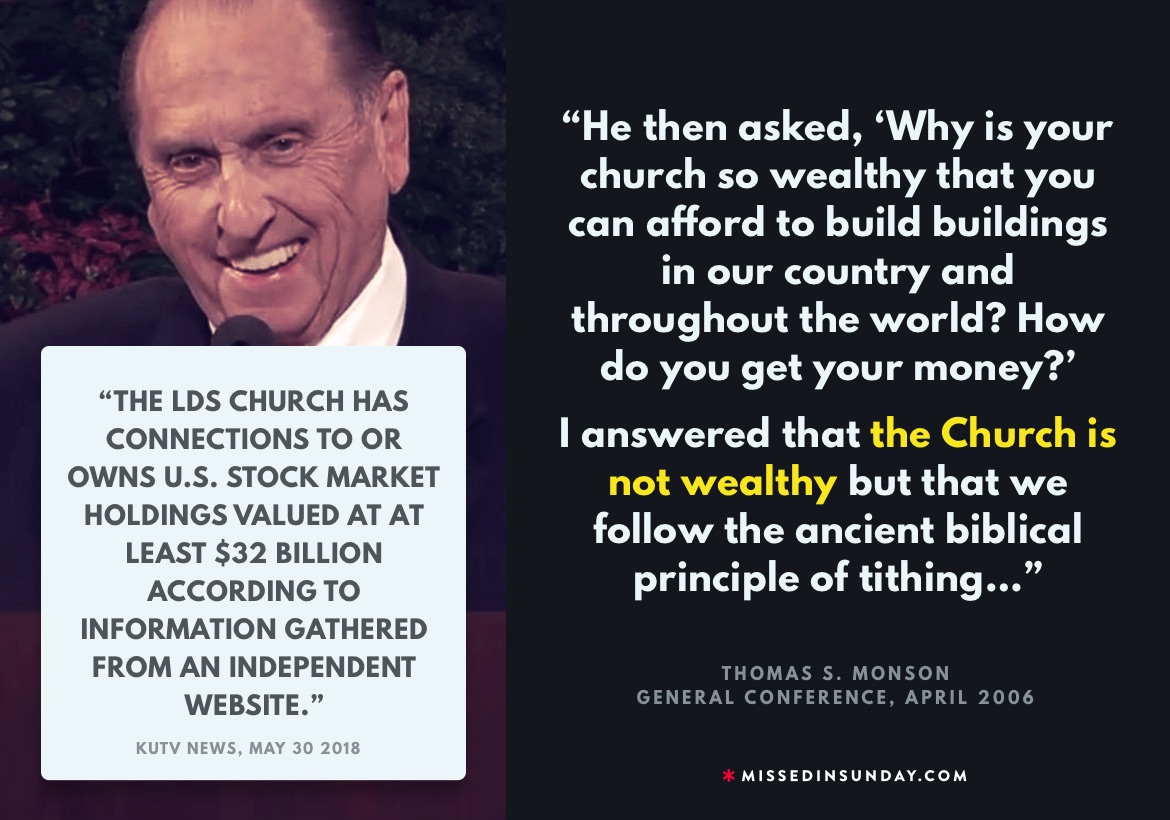
Not Wealthy
Excerpt from an April 2006 address by Thomas S. Monson, ’Our Sacred Priesthood Trust’: 1
“I have experienced many opportunities. One occurred 21 years ago, prior to the time when the German Democratic Republic—or East Germany, as it was more commonly known—was freed from Communist rule. I was visiting with the East German state secretary, Minister Gysi. At that time our temple at Freiberg, in East Germany, was under construction, along with two or three meetinghouses. Minister Gysi and I visited on a number of subjects, including our worldwide building program. He then asked, “Why is your church so wealthy that you can afford to build buildings in our country and throughout the world? How do you get your money?”
I answered that the Church is not wealthy but that we follow the ancient biblical principle of tithing, which principle is reemphasized in our modern scripture. I explained also that our Church has no paid ministry and indicated that these were two reasons why we were able to build the buildings then under way, including the beautiful temple at Freiberg.”
‘MormonLeaks: LDS Church connected to at least $32B in U.S. stock market’, KUTV News, May 30 2018: 2
“The church — officially titled The Church of Jesus Christ of Latter-day Saints — does not not publish the details of its finances, but the website MormonLeaks.io released information it says connects the church to 13 LLC companies that collectively owned the stocks at the end of 2017 and provides the collective value at $32,769,914,000. One of the financial reports was from 2015.
MormonLeaks wrote that each of the 13 companies have domains that are hosted by the LDS Church servers, that also hosts LDS.org and Mormon.org. “All of them were registered on July 21, 2016,” according to MormonLeaks, that also provided a more technical explanation. It claimed there is little doubt the LLC domains are owned the church.”
Further Study
MormonLeaks™ Compiles Information Connecting Mormon Church to $32 Billion of Investments – https://mormonleaks.io/newsroom/2018/05/30/mormonleaks-compiles-information-connecting-mormon-church-to-32-billion-of-investments/
References
References 1 Our Sacred Priesthood Trust – https://www.lds.org/general-conference/2006/04/our-sacred-priesthood-trust?lang=eng 2 MormonLeaks: LDS Church connected to at least $32B in U.S. stock market – http://kutv.com/news/local/mormonleaks-says-new-documents-link-lds-church-to-companies-worth-over-32-billion -

Tithes Sufficient
April 1907 LDS General Conference, Joseph F. Smith, Pg. 7: 1
At last we are in a position that we can pay as we go. We do not have to borrow any more, and we wont have to if the Latter-day Saints continue to live their religion and observe this law of tithing, It is the law of revenue to the Church. Furthermore, I want to say to you, we may not be able to reach it right away, but we expect to see the day when we will not have to ask you for one dollar of donation for any purpose, except that which you volunteer to give of your own accord, because we will have tithes sufficient in the storehouse of the Lord to pay everything that is needful for the advancement of the kingdom of God. I want to live to see that day, if the Lord will spare my life. It does not make any difference, though, so far as that is concerned, whether I live or not. That is the true policy, the true purpose of the Lord in the management of the affairs of His Church.
‘MormonLeaks: LDS Church connected to at least $32B in U.S. stock market’, KUTV News, May 30 2018: 2
“The church — officially titled The Church of Jesus Christ of Latter-day Saints — does not not publish the details of its finances, but the website MormonLeaks.io released information it says connects the church to 13 LLC companies that collectively owned the stocks at the end of 2017 and provides the collective value at $32,769,914,000. One of the financial reports was from 2015.
MormonLeaks wrote that each of the 13 companies have domains that are hosted by the LDS Church servers, that also hosts LDS.org and Mormon.org. “All of them were registered on July 21, 2016,” according to MormonLeaks, that also provided a more technical explanation. It claimed there is little doubt the LLC domains are owned the church.”
Further Study
MormonLeaks™ Compiles Information Connecting Mormon Church to $32 Billion of Investments – https://mormonleaks.io/newsroom/2018/05/30/mormonleaks-compiles-information-connecting-mormon-church-to-32-billion-of-investments/
References
References 1 April 1907 LDS General Conference, Joseph Fielding Smith – https://archive.org/details/conferencereport1907a 2 MormonLeaks: LDS Church connected to at least $32B in U.S. stock market – http://kutv.com/news/local/mormonleaks-says-new-documents-link-lds-church-to-companies-worth-over-32-billion -

Pay Tithing
December 2012 Ensign Article, ’Sacred Transformations’: 1
“After reading these scriptures together, Bishop Orellana looked at the new convert and said, “If paying tithing means that you can’t pay for water or electricity, pay tithing. If paying tithing means that you can’t pay your rent, pay tithing. Even if paying tithing means that you don’t have enough money to feed your family, pay tithing. The Lord will not abandon you.”
The next Sunday, Amado approached Bishop Orellana again. This time he didn’t ask any questions. He simply handed his bishop an envelope and said, “Bishop, here is our tithing.””
‘MormonLeaks: LDS Church connected to at least $32B in U.S. stock market’, KUTV News, May 30 2018: 2
“The church — officially titled The Church of Jesus Christ of Latter-day Saints — does not not publish the details of its finances, but the website MormonLeaks.io released information it says connects the church to 13 LLC companies that collectively owned the stocks at the end of 2017 and provides the collective value at $32,769,914,000. One of the financial reports was from 2015.
MormonLeaks wrote that each of the 13 companies have domains that are hosted by the LDS Church servers, that also hosts LDS.org and Mormon.org. “All of them were registered on July 21, 2016,” according to MormonLeaks, that also provided a more technical explanation. It claimed there is little doubt the LLC domains are owned the church.”
Further Study
MormonLeaks™ Compiles Information Connecting Mormon Church to $32 Billion of Investments – https://mormonleaks.io/newsroom/2018/05/30/mormonleaks-compiles-information-connecting-mormon-church-to-32-billion-of-investments/
References
References 1 Sacred Transformations – https://www.lds.org/ensign/2012/12/sacred-transformations?lang=eng 2 MormonLeaks: LDS Church connected to at least $32B in U.S. stock market – http://kutv.com/news/local/mormonleaks-says-new-documents-link-lds-church-to-companies-worth-over-32-billion -

Transparency
October 1905 Conference Report, Prophet Joseph F. Smith, Pg. 5: 1
“I want to say further to the Saints, that your brethren to whom you have entrusted the care and management of the finances of the Church stand ready and willing, any moment,’ to answer to YOU — to Latter-day Saints, to tithepayers, to those who are in the faith of the Gospel — for our stewardship. We can give you an account of our doings to the last senine; and I defy any man on earth to point his finger to a dollar that is willfully wasted, or stolen by the servants of God. The tithing books are kept as accurately and as perfectly as any books kept in any bank. Every man that pays a dollar tithing gets his credit on the books; and if he wants to see that his credit is there he can go and see for himself. But we do not propose to open our books and show your accounts to every Tom, Dick and Harry in the land that never did pay any tithing. We do not propose to do that, if we can help it. But you Latter-day Saints who pay your tithes and your offerings, if you want to see for yourselves, that you may be eye and ear witnesses, the books are open to you, and you can come and examine your accounts any business day you want.”
April 1906 Conference Report, Prophet Joseph F. Smith, Pg. 6,7: 2
“I want to say to the Latter-day Saints that the year 1905 has been the banner year for the tithings of the people. You can put that down in your memorandum books, and remember it. Never in the history of the Church of Jesus Christ of Latter-day Saints have the people contributed as much tithing as they did in 1905. And yet they have not done anything more than their duty; in fact, there are a great many Latter-day Saints that have not done their duty, as the books will show.
In this connection I may say that a most thorough and searching auditation of the books of the Trustee-in-Trust, the books of the Presiding Bishopric, and the books of the Deseret News Company, has been made by the auditors that were appointed and sustained at our last conference. Before the conclusion of this conference we will read you their report, and I believe you will be perfectly satisfied with it. The man that complains about not knowing what is done with the tithing, in ninety-nine cases out of a hundred is the man who has no credit on the books of the Church for paying tithing. We do not care to exhibit the books of the Church to such carpers and to that class of people. But there is not a tithepayer in the Church that cannot go to the Presiding Bishop’s Office, or to the office of the Trustee-in-Trust, if he desires, and find his account, and see to it that every dollar he has given to the Lord for tithing is credited to him. Then, if he wants to be more searching as a tithepayer and find out what is done with the tithing, we will set before him the whole thing, and if he has any good counsel to give us we will take it from him. But we will not — because we do not have to, and it is not the business of the world to require it open our books to the world, unless we wish to. We are not ashamed of them. We are not afraid for them to be inspected. They are honest and straight; and there is not a man in the world that will look at them, but will say so, if he is honest himself.”
Excerpt from ’LDS Church Finances from the 1830’s to the 1990’s’, by historian D. Michael Quinn: 3
“The combination of bad financial investments, declines in Church businesses, and the Great Depression once again pushed the LDS church into deficit spending. First Counselor J. Reuben Clark announced to general conferences that the Church had spending deficits amounting to $100,000 in 1937 and to nearly $900,000 in 1938. In President Clark’s view, voluntary disclosure of regrettable deficits was a way to encourage greater austerity on the part of the leaders at headquarters and elsewhere. During the 1940s Clark allowed the church to spend only 27% of its annual tithing revenues.
Twenty years later, the First Presidency’s deficit spending stopped the practice of releasing detailed financial reports at April general conferences, a regular practice since 1915. During a few months in mid-1956, the Church lost a million dollars of tithing funds invested in municipal government bonds. Yet later that year, the First Presidency committed two thirds of Church income to continued investment in municipal bonds. ’08 The next annual financial report gave fewer details about expenditures of Church funds, and the Church published its last financial report in April 1959.
By the end of 1959, the Church had spent $8 million more than that year’s income. This deficit was extraordinary in view of the fact that the Church had had surplus income of $7 million after 1958’s expenditures. To conceal the massive increase of building expenditures in the last half of 1959, which created that deficit, the Church stopped releasing even abbreviated financial reports. At the close of 1961, Apostle Harold B. Lee expressed “my stubborn resistance to the principle of ‘deficit spending,’ supposedly justified in the hope of increasing the tithing of the Church to cover the deficit,” to no avail.”
References
References 1 October 1905 Conference Report – https://archive.org/details/conferencereport1905sa 2 April 1906 Conference Report – https://archive.org/details/conferencereport1906a 3 ’LDS Church Finances from the 1830’s to the 1990’s’, by historian D. Michael Quinn – https://www.sunstonemagazine.com/pdf/102-17-29.pdf -
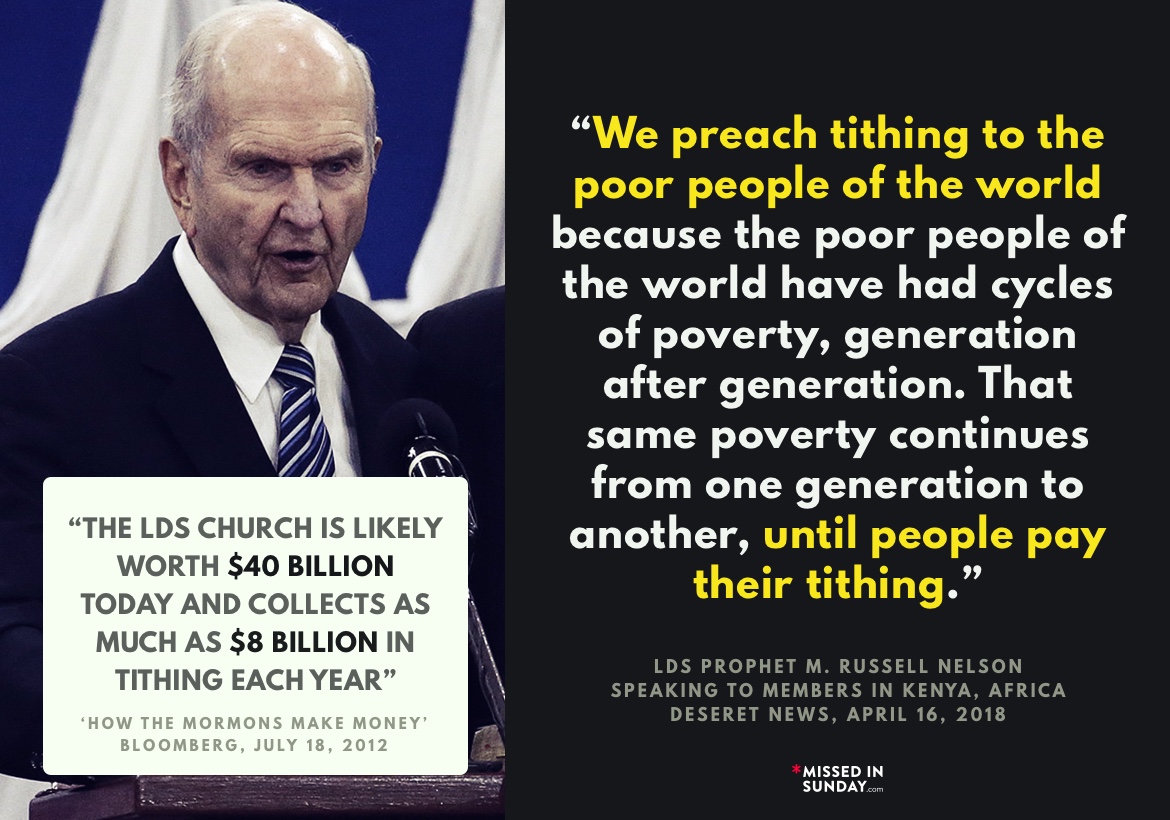
We Preach Tithing
From an article published in the Deseret News, April 16, 2018: 1
“They received a message tailored for eastern Africa, where many tribes continue to insist that grooms or their families provide a dowry or pay a price for a bride.
“That’s not the Lord’s way,” President Russell M. Nelson told about 2,000 Kenyans and other Africans Monday night inside a large, oval, wooden event center styled after traditional huts in Nairobi, Kenya. “The Lord’s way is to be married in the temple, for time and all eternity, with your children sealed to you.”
He added that if he’d had to pay for his wife, “I would have missed five children, because only with my last five was I out of debt.”
They received a message tailored for eastern Africa, where many tribes continue to insist that grooms or their families provide a dowry or pay a price for a bride.
“That’s not the Lord’s way,” President Russell M. Nelson told about 2,000 Kenyans and other Africans Monday night inside a large, oval, wooden event center styled after traditional huts in Nairobi, Kenya. “The Lord’s way is to be married in the temple, for time and all eternity, with your children sealed to you.”
He added that if he’d had to pay for his wife, “I would have missed five children, because only with my last five was I out of debt.”
President Nelson also said tithing can break cycles of poverty in poor nations and families.“We preach tithing to the poor people of the world because the poor people of the world have had cycles of poverty, generation after generation,” he said. “That same poverty continues from one generation to another, until people pay their tithing.”
The law of the tithe was followed by ancient peoples as taught by Old Testament prophets. LDS faithful believe God restored the law and its blessings for those who follow it by giving one-tenth of their income to the church.”
From a 2012 article published in Bloomberg, ‘How The Mormons Make Money’: 2
“According to U.S. law, religions have no obligation to open their books to the public, and the LDS Church officially stopped reporting any finances in the early 1960s. In 1997 an investigation by Time used cross-religious comparisons and internal information to estimate the church’s total value at $30 billion. The magazine also produced an estimate that $5 billion worth of tithing flows into the church annually, and that it owned at least $6 billion in stocks and bonds. The Mormon Church at the time said the estimates were grossly exaggerated, but a recent investigation by Reuters in collaboration with sociology professor Cragun estimates that the LDS Church is likely worth $40 billion today and collects up to $8 billion in tithing each year.”
References
References 1 ‘Dowry is not the Lord’s way’ In Kenya, LDS President Nelson says tithing breaks poverty cycle’, Deseret News – https://www.deseretnews.com/article/900016023/dowry-is-not-the-lords-way-in-kenya-lds-president-nelson-says-tithing-breaks-poverty-cycle.html 2 ‘How The Mormons Make Money’, Bloomberg – https://archive.org/details/HowTheMormonsMakeMoney and https://www.bloomberg.com/news/articles/2012-07-18/how-the-mormons-make-money -
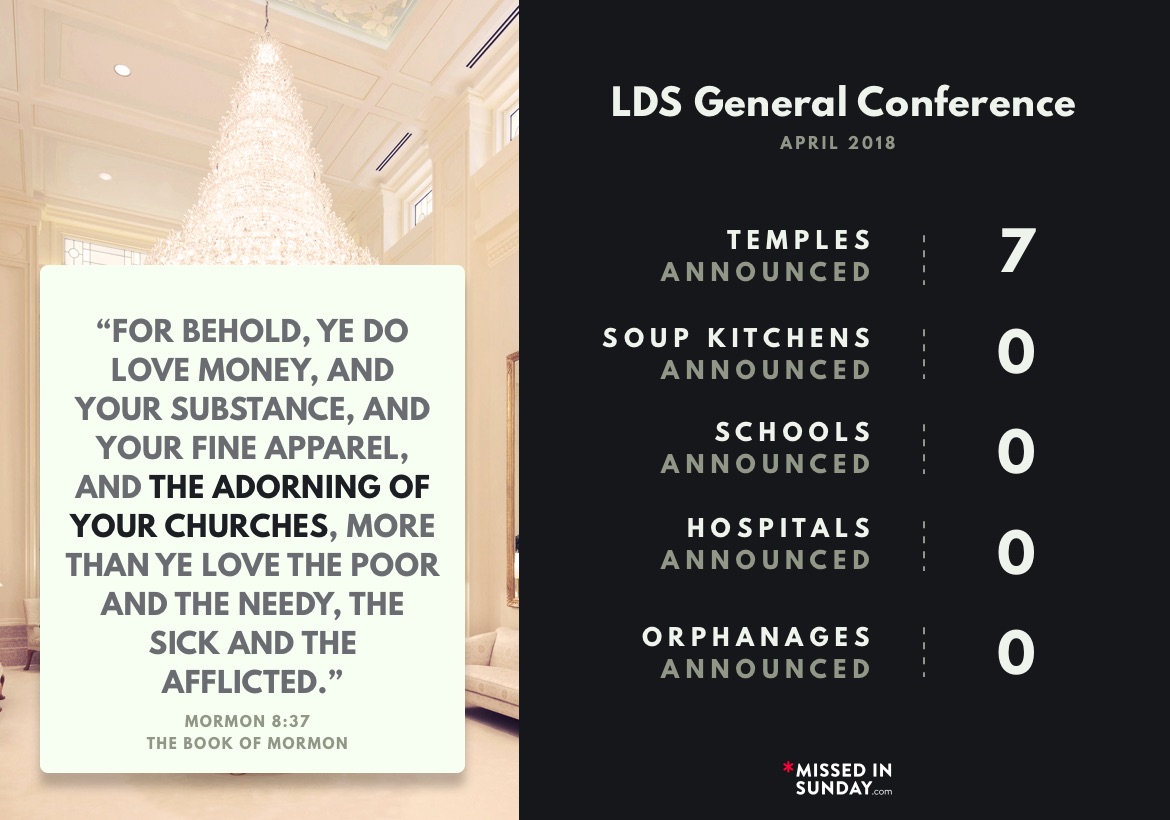
Love of Money
LDS General Conference, April 2018 – https://www.lds.org/general-conference?cid=HP15GC&lang=eng
Mormon 8: 37-39, The Book of Mormon: 1
37 For behold, ye do love money, and your substance, and your fine apparel, and the adorning of your churches, more than ye love the poor and the needy, the sick and the afflicted.
38 O ye pollutions, ye hypocrites, ye teachers, who sell yourselves for that which will canker, why have ye polluted the holy church of God? Why are ye ashamed to take upon you the name of Christ? Why do ye not think that greater is the value of an endless happiness than that misery which never dies—because of the praise of the world?
39 Why do ye adorn yourselves with that which hath no life, and yet suffer the hungry, and the needy, and the naked, and the sick and the afflicted to pass by you, and notice them not?
References
References 1 Mormon 8: 37 – https://www.lds.org/scriptures/bofm/morm/8.37,39?lang=eng&clang=eng#p36 -
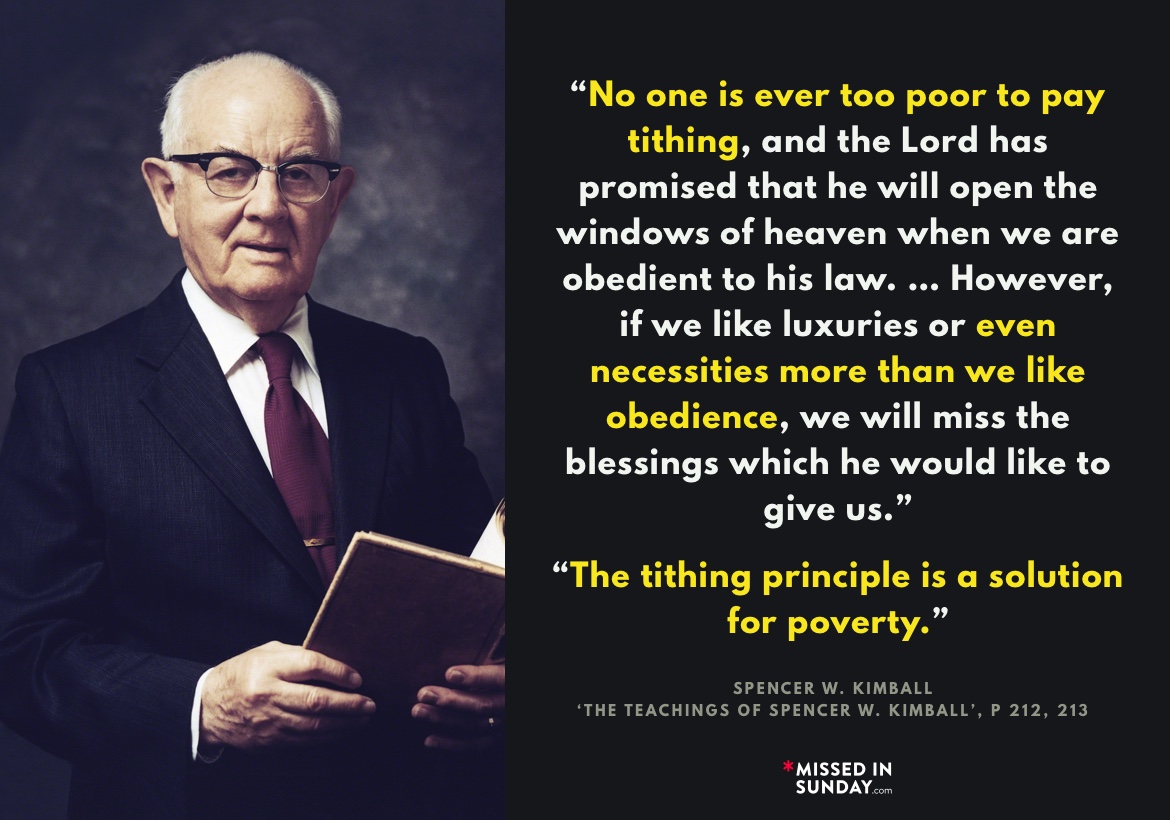
Tithing and the Poor
Excerpt from “The Teachings of Spencer W. Kimball”, Pg. 212,213: 1
The poor have special need to tithe. There are people who say they cannot afford to pay tithing, because their incomes are small. They are the people who need the blessings of the Lord! No one is ever too poor to pay tithing, and the Lord has promised that he will open the windows of heaven when we are obedient to his law. He can give us better salaries, he can give us more judgment in the spending of our money. He can give us better health, he can give us greater understanding so that we can get better positions. He can help us so that we can do the things we want to do. However, if we like luxuries or even necessities more than we like obedience, we will miss the blessings which he would like to give us.
One woman went to her bishop and wanted to pay a little tithing that she owed. The bishop said, “No, you keep it. You can’t afford to pay tithing. You need every cent that you make.” But this woman said, “Bishop, you have no right to deprive me of the blessing that I will receive if I pay tithing.” Encourage children to tithe. Now, I know that you do not have very big incomes, but remember it does not matter how little you make, you pay your tithing. Give the children a chance to learn tithing. If one of the little boys or girls earns only fifty cents in a whole year, he goes to the branch president and pays one nickel for tithing and that is just as good as the man who pays $10,000. The Lord is not looking at the amount; all he is looking at is the percentage.
Let children see parents pay tithing. So, wouldn’t it be wonderful if every father in Zion would take his children with him to pay his tithing and let them see him give the bishop the amount of money that represents sacrifice to him, so that the children also would feel the need of it.
The tithing principle is a solution for poverty. The cure to poverty lies in Isaiah fifty-eighth chapter and in Malachi third chapter: “Bring ye all the tithes into the storehouse, that there may be meat in mine house. ” I hear voices asking in insolence and wonder and disbelief: “How can a scripture solve poverty and want?” Then I quote further: “And prove me now herewith, saith the Lord of hosts, if I will not open you the windows of heaven, and pour you out a blessing, that there shall not be room enough to receive it.” (Malachi 3:10.) Ah! That is what we need across the tracks, in India and Pakistan, in our big cities, in disadvantaged countries — to have the heavens open. Apparently earth has not provided the answer; now shall we try heaven? The Lord has promised to open the windows of heaven. To hear the population explosion experts talk and write — those people who think themselves so wise — they would depopulate the earth so that the few left would roll in luxury rather than that all the Lord’s children could come to earth and have a body and mortality and the good things of the earth….
References
References 1 The Teachings of Spencer W. Kimball – https://deseretbook.com/p/teachings-spencer-w-kimball-edward-l-2458?variant_id=109805-paperback -
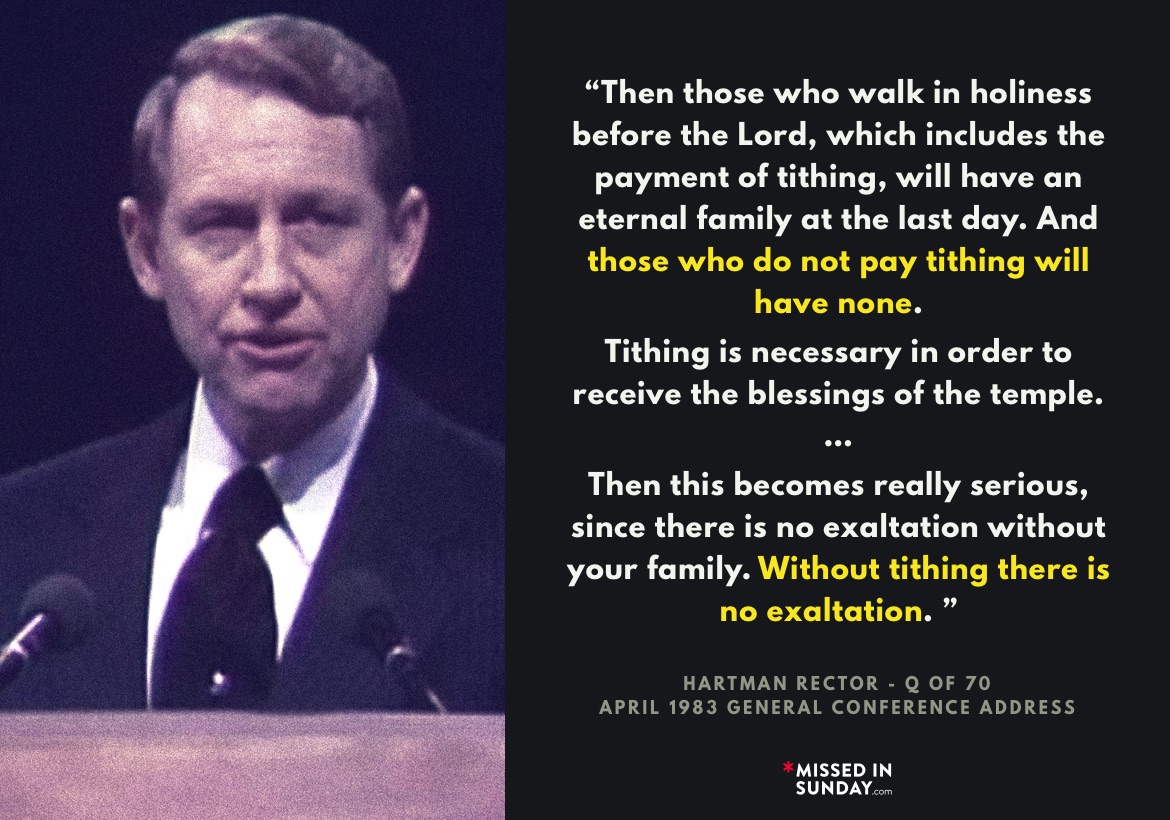
No Exaltation
Excerpt from an 1983 General Conference address by address by Hartman Rector, ‘That Ye May Have Roots and Branches’: 1
“In other words, those who pay tithing will have roots and branches at the last day and those who do not will have neither roots nor branches. Now what are our roots? Alex Haley wrote a book about roots. Obviously our roots are our ancestors. And what are our branches? They are our children. Then those who walk in holiness before the Lord, which includes the payment of tithing, will have an eternal family at the last day. And those who do not pay tithing will have none.
Tithing is necessary in order to receive the blessings of the temple. If a man were to keep all of the Lord’s commandments with the exception of tithing, he still could never be married for time and all eternity in the temple; thus, he would have neither roots nor branches at the last day.
Then this becomes really serious, since there is no exaltation without your family. Without tithing there is no exaltation. As we think about it, we know this is true.”
References
References 1 That Ye May Have Roots and Branches – https://www.lds.org/general-conference/1983/04/that-ye-may-have-roots-and-branches?lang=eng -

Buy anything
Excerpt from the LDS ‘For the Strength of Youth’ (2011): 1
“A tithe is one-tenth of your income. In order to enter the temple, you must be a full-tithe payer.”
Question 10 from the LDS Temple recommend interview questions: 2
“10 Are you a full-tithe payer?”
Excerpt from the LDS endowment ceremony performed in the temple: 3
PETER: We do not wonder that you cannot comprehend such doctrine. Have you any tokens or signs?
LUCIFER: [Interjecting.] Do you have any money?
PETER: We have sufficient for our needs.
LUCIFER: You can buy anything in this world for money.
PETER: [To Adam.] Do you sell your tokens or signs for money? You have them, I presume.
ADAM: I have them, but I do not sell them for money. I hold them sacred. I am looking for the further light and knowledge Father promised to send me.
PETER: That is right. We commend you for your integrity. Good day. We shall probably visit you again.
References
References 1 ‘For the Strength of Youth’ pamphlet – https://www.lds.org/bc/content/shared/content/english/pdf/ForTheStrengthOfYouth-eng.pdf?lang=eng 2 Referenced in ‘Preparing for a Heavenly Marriage’ by Robert D. Hales – https://www.lds.org/liahona/2006/02/preparing-for-a-heavenly-marriage?lang=eng 3 LDS Endowment, the celestial world – http://www.ldsendowment.org/telestial.html -
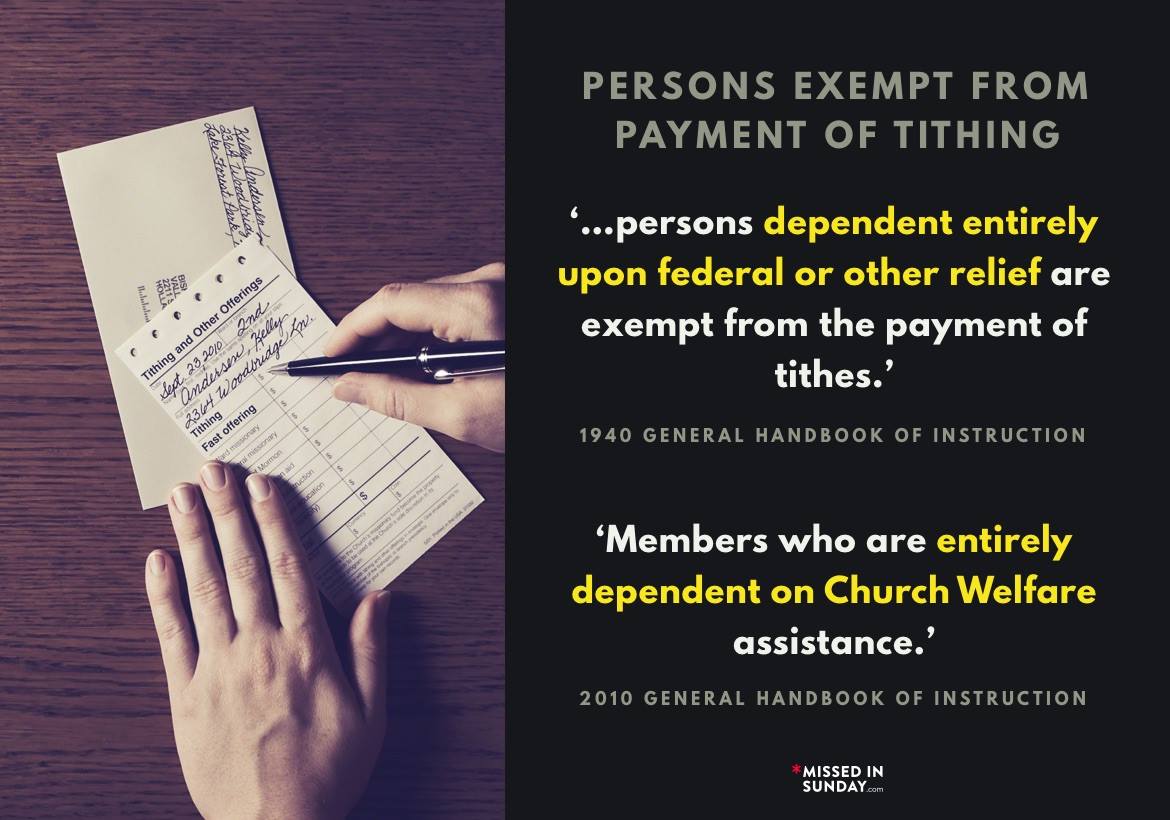
Exempt
Excerpt from the LDS 1940 General Handbook of Instruction: 1
Who Should Pay Tithing
All members of the Church who have any income or increase from property, or who receive wages, salaries or gifts, should pay one-tenth of their “increase” annually. (See Doc. and Cov. 119:4.) Children eight years of age or over who have been baptized are amenable to the law of tithing and should be encouraged to tithe their earnings. They should be given an opportunity to pay some tithing each year. no matter how small the amount.Persons Exempt From Payment of Tithing
Aged persons without incomes; women who have no income separate from that of their husbands; children who have no individual source of revenue; and persons dependent entirely upon federal or other relief are exempt from the payment of tithes. Those receiving federal or other relief may be considered exempt because the relief rendered is supposedly only sufficient to sup-ply their absolute needs. All Latter-day Saints should be encouraged to cultivate the spirit and practice of tithe paying when conditions are such that they are able to earn.Excerpt from the LDS 1968 General Handbook of Instruction: 2
Who Should Pay Tithing
Church members should pay one-tenth of their interest (income) annually into the tithing funds of the Church.Those without income (including wives who have no separate income from their husbands) , and those entirely dependent on relief, are exempt from the payment of tithing.
Missionaries on full-time missions are not required to pay tithing on money received from their families or others for their support. Additional personal income should be tithed.
Excerpt from the LDS 2010 General Handbook of Instruction: 3
Who Should Pay Tithing
All members who have income should pay tithing, with the following exceptions:1. Members who are entirely dependent on Church Welfare assistance.
2. Full-time missionaries. (However, missionaries should pay tithing on personal income beyond the amount they receive for their support.)References
References 1 General Handbook of Instruction (1940) – https://drive.google.com/file/d/0B9Vs4YXzKZEpcGNXcnh5NUFobk0/view?usp=sharing 2 General Handbook of Instruction (1968) – https://wlstorage.net/file/mormon-general-handbook-of-instructions-1968.pdf 3 General Handbook of Instruction (2010) – https://onedrive.live.com/redir?resid=42CC14E97C160EBE%2112478&authkey=%21AJVCwROgxQq8OtU&ithint=file%2Cpdf -

Tithing First
2012 December Ensign – Sacred Transformations: ““If paying tithing means that you can’t pay for water or electricity, pay tithing. If paying tithing means that you can’t pay your rent, pay tithing. Even if paying tithing means that you don’t have enough money to feed your family, pay tithing. “[footnote]Sacred Transformations, Aaron L. West – 2012 December Ensign [/footnote]
“…a recent investigation by Reuters in collaboration with sociology professor Cragun estimates that the LDS Church is likely worth $40 billion today and collects up to $8 billion in tithing each year.”[footnote]How the Mormons Make Money – Bloomberg, July 2012 [/footnote]
Sacred Transformations, Aaron L. West – 2012 December EnsignHow the Mormons Make Money – Bloomberg, July 2012LDS Church Finances – Wikipedia -
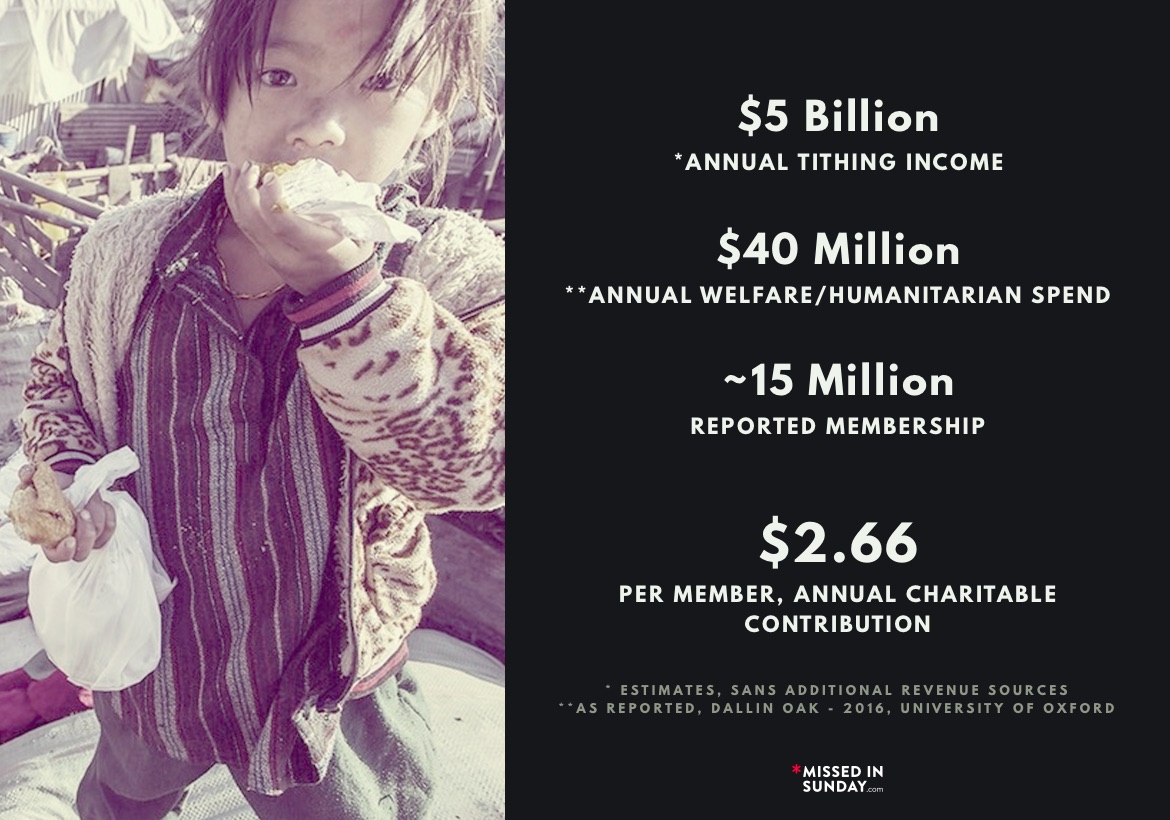
Charity
It is estimated the LDS church pulls in between 5 billion dollars annually in tithing revenue alone, sans additional for-profit enterprises. [footnote]Mormons Inc. – Time Magazine [/footnote]
From a Dallin Oak (LDS Apostle) 2016 address on religious freedom at the University of Oxford:[footnote]Transcript: Elder Dallin H. Oaks at University of Oxford [/footnote]
“Care for the poor and needy is not optional or incidental in our Church. We do this worldwide. For example, in the year 2015 we had 177 emergency response projects in 56 countries. In addition, we had hundreds of projects that impacted more than a million people in seven other categories of assistance, such as clean water, immunization, and vision care. For more than 30 years the magnitude of these efforts has averaged about 40 million dollars a year.”
The Deseret Morning News LDS Church Almanac gives information on historical membership records of the LDS church. The church’s reported membership as of December 31, 2015 was 15,634,199.[footnote]2015 Statistical Report for April 2016 General Conference [/footnote] The growth of 1.7% in 2015 is the lowest percentage growth since 1937.[footnote]LDS Church Growth Slows to Its Lowest Level Since 1937, But Here’s the Good News in That [/footnote]
Though the LDS church has a robust welfare program, funded through fast offerings, the percentage of tithing funds that go towards external humanitarian causes is fairly low considerings it substantial resources. Even adjusting the estimated numbers to lean more conservative, the per-member donation would still fall under $10 annually.
Contrast this with the recent estimated $2 billion cost of the City Creek mega-mall in downtown Salt Lake City. [footnote]The money behind the mormon message – Salt Lake Tribune [/footnote]
Since 1959 the LDS church has not publicly disclosed its financial statements… even to its tithe payers.
Crash Course:
How the Mormons Make Money – Bloomberg
LDS Church Finances – Wikipedia
-
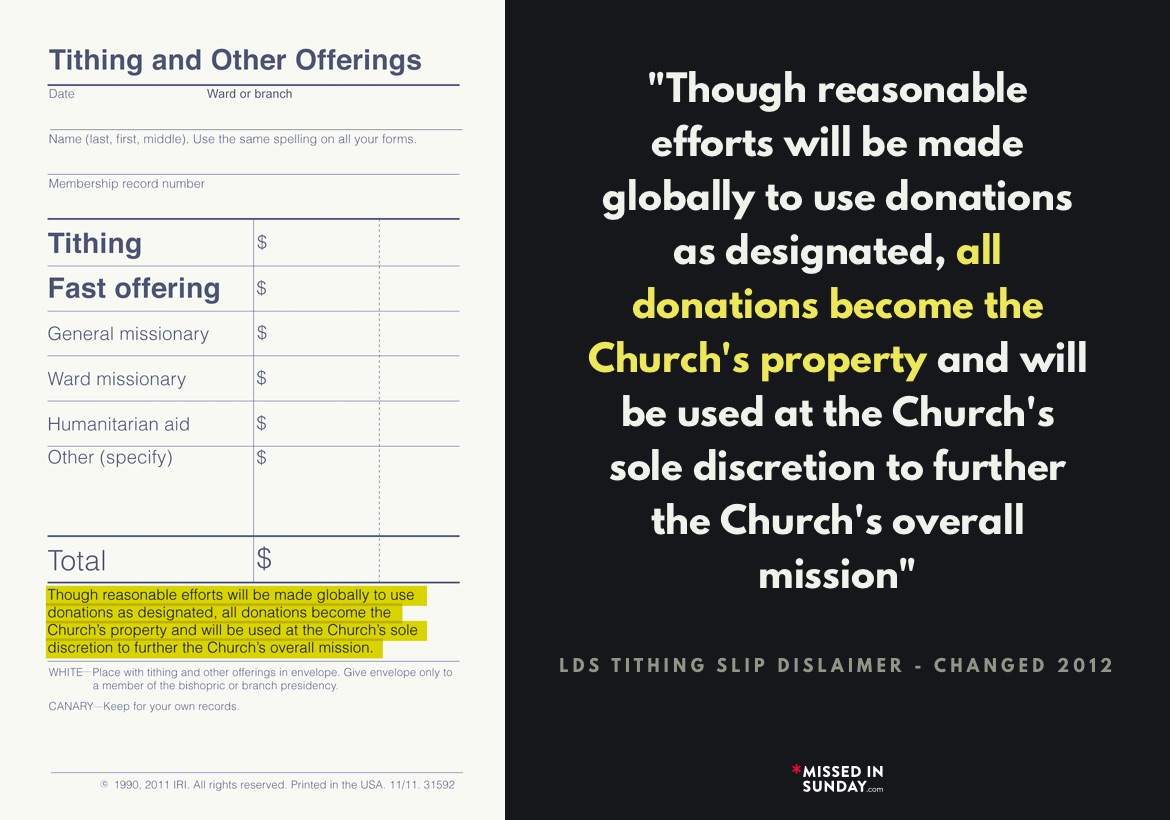
2012 Tithing Slip Change
In 2012 there was an disclaimer added to the LDS tithing slip which reads “Though reasonable efforts will be made globally to use donations as designated, all donations become the Church’s property and will be used at the Church’s sole discretion to further the Church’s overall mission.”
Since 1959 the LDS church has not publicly disclosed its financial statements… even to its tithe payers.
Crash Course:
Next time Mormons pay tithing, they may notice something new – Salt Lake Tribune
LDS Church Finances – Wikipedia
-

Closed Books
When asked about the Church’s lack of financial reporting by a reporter in 2002, then LDS Prophet, Gordon Hinkley responded as follows:
REPORTER: In my country the…we say the people’s churches, the Protestants, the Catholics, they publish all their budgets, to all the public.
HINCKLEY: Yeah. Yeah.
REPORTER: Why is it impossible for your church?
HINCKLEY: Well, we simply think that the…that information belongs to those who made the contribution, and not to the world. That’s the only thing. Yes.The LDS Church has not publicly disclosed its financial statements in the United States since 1959… even to its tithe payers.
[footnote] Finances of The Church of Jesus Christ of Latter-day Saints – Wikipedia [/footnote]
Audio of the interview:
Crash Course:



